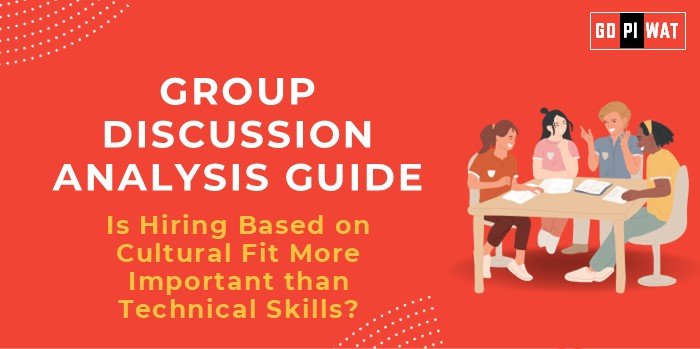📋 Group Discussion (GD) Analysis Guide: Is Hiring Based on Cultural Fit More Important than Technical Skills?
🌐 Introduction to the Topic
- Context: Hiring for cultural fit versus technical skills is an ongoing debate in corporate management, particularly in industries driven by innovation and collaboration. Companies like Google and Netflix prioritize cultural alignment to ensure cohesive team dynamics, while industries like IT services often lean towards technical proficiency.
- Topic Background: The concept of “cultural fit” gained traction in the 1980s as companies sought to create harmonious work environments aligned with organizational values. Recently, studies by Deloitte and SHRM have shown that cultural fit significantly affects employee retention and job satisfaction.
📊 Quick Facts and Key Statistics
- 💼 Turnover Costs: 89% of hiring failures are attributed to poor cultural fit (Leadership IQ, 2024).
- 📈 Productivity Boost: Teams aligned culturally report a 23% increase in productivity (Forbes, 2023).
- 💰 Training Costs: Reskilling for technical skills averages $5,000 per employee but may save on recruiting costs (SHRM, 2023).
- 🔍 Sectoral Divide: 78% of tech hiring managers prioritize technical skills, while only 46% in creative fields do (HBR, 2024).
👥 Stakeholders and Their Roles
- 🏢 Organizations: Define and communicate cultural values; balance technical skill training programs.
- 👩💼 Employees: Bring personal alignment with organizational values or adapt over time.
- 💼 HR and Recruitment Teams: Develop processes to evaluate both cultural alignment and technical competencies.
- 📜 Industry Bodies: Create frameworks for evaluating talent holistically.
🏆 Achievements and Challenges
✨ Achievements
- Enhanced Retention: Companies like Zappos reduced turnover by 50% through hiring for cultural fit.
- Team Synergy: Cultural alignment fosters collaboration and reduces workplace conflict.
- Upskilling Initiatives: Organizations investing in upskilling address technical gaps without compromising cultural cohesion.
⚠️ Challenges
- Subjectivity in Fit: Cultural fit assessments can reinforce unconscious biases.
- Immediate Skill Needs: Roles requiring niche skills often cannot wait for cultural adaptation.
- Global Hiring: Diverse teams may find cultural alignment harder to define universally.
🌍 Global Comparisons
- Google (USA): Strong focus on “Googliness” while offering technical training programs.
- Germany: Apprenticeship models focus on technical mastery with later emphasis on cultural adaptation.
💡 Structured Arguments for Discussion
- Supporting Stance: “Hiring for cultural fit ensures long-term employee satisfaction and reduces turnover, which directly saves costs and enhances productivity.”
- Opposing Stance: “Technical skills are the foundation of job performance, especially in roles requiring expertise, and cannot be compromised.”
- Balanced Perspective: “A hybrid approach—prioritizing cultural fit in creative industries and technical skills in technical roles—may provide optimal outcomes.”
🔍 Effective Discussion Approaches
🌟 Opening Approaches
- “Given that 89% of hiring failures result from poor cultural fit, isn’t this a priority over technical expertise?”
- “With industries like IT requiring rapid deployment, can cultural fit outweigh immediate technical needs?”
💬 Counter-Argument Handling
- Acknowledge importance of both factors.
- Highlight case studies (e.g., Google, Zappos).
- Suggest actionable solutions, like onboarding programs.
📈 Strategic Analysis of Strengths and Weaknesses
- Strengths: Enhances team dynamics, boosts long-term retention.
- Weaknesses: Risk of bias, slower onboarding for technical gaps.
- Opportunities: Upskilling, hybrid approaches.
- Threats: Immediate project delays, unclear cultural frameworks.
📘 Connecting with B-School Applications
- Real-World Applications:
- Discuss links with organizational behavior, team management, and leadership case studies.
- Sample Questions:
- “How can companies balance technical skills and cultural alignment?”
- “Provide examples of industries where cultural fit is critical.”
- Insights for Students:
- Explore hybrid hiring models and the role of HR analytics.


